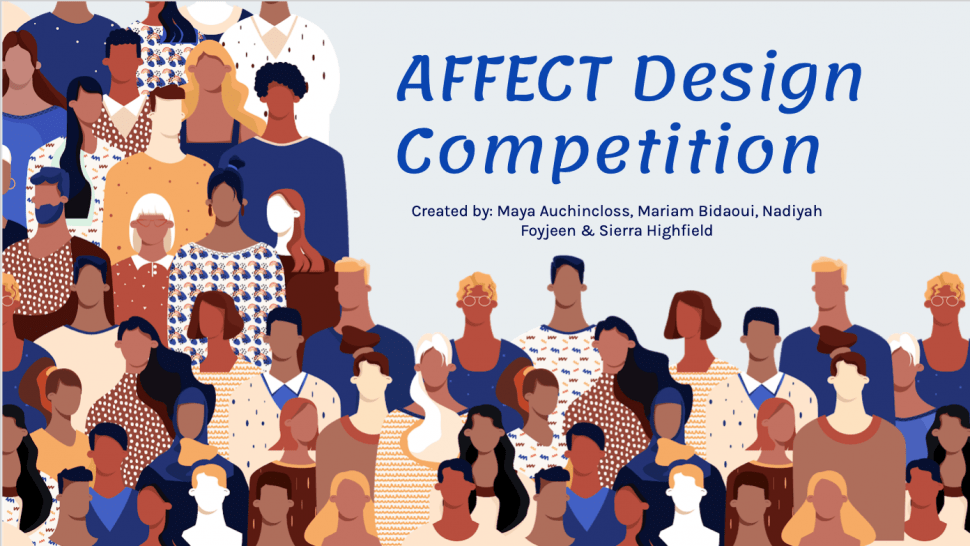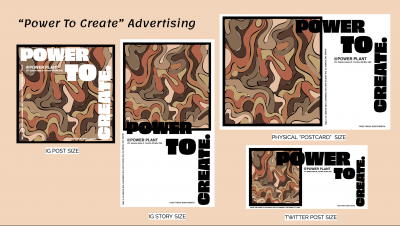
Sierra Highfield was enrolled in a post-secondary design course at another institution before discovering Humber College’s Bachelor of Design program. She was briefly introduced to User Experience (UX) Design, which focuses on and considers the needs of people who use a certain place or product. Highfield fell in love and decided to pursue a program at Humber that focused more on the user experience.
“What set Humber apart was the wide range of course offerings. I’ve never seen a curriculum that really dives into the basics, all the way to an advanced understanding of a principle,” said second-year student Highfield.
The decision paid off. She is part of a group that recently won the inaugural AFFECT Design Challenge, hosted in partnership with Humber’s Centre for Creative Business Innovation (CCBI) and The Power Plant Contemporary Art Gallery.
The challenge started with a question: How might we expand the community of contemporary art visitors, and engage a more diverse and representative community for contemporary art museums and galleries? The solutions could be digital, physical, a campaign – any creative design format.
"The Power Plant Contemporary Art Gallery understands that the general public is comprised of individuals, each with their own perspectives and life experiences. We felt strongly that the theme for this AFFECT competition should be making contemporary art more accessible to more people,” said Josh Heuman, the curator of Education and Public Programs at the gallery.
"Reviewing the AFFECT proposals provided us with external points of view, with different frames of reference, and several unconventional solutions to improving accessibility.”
The gallery is reviewing the winning proposals to evaluate their practicality. The solutions may eventually be implemented at the gallery.
The winning proposal was created by Highfield and her classmates, Mary Auchincloss, Mariam Bidaoui and Nadiyah Foyjeen.
When they were brainstorming, the group discussed accessibility in the art community and how marginalized communities might be affected.
“Marginalized communities should be seeing themselves all over the wall. We need to make it easier for them to get their artwork on the wall,” said Highfield. 
The group aimed to tackle apprehensiveness toward contemporary art and reframe it as a community activity that can be enjoyed by anyone.
Their idea was for the gallery to showcase a new exhibit every month, each one focusing on an important social issue. Submissions of photos, digital illustrations, videos, even GIFs would be accepted and displayed on digital monitors.
“We get more art in the room. There would also be a digital magazine that recaps each exhibition, and a print version.”
The organizers of AFFECT recognized the need for inclusivity and diversity within the art world – and the cost of upgrades.
“We’re hyper aware of the changes that need to be made in gallery settings and spaces. The gallery was working on creating accessible audio tours before the pandemic, so we played off that,” said CCBI project manager Hana Glaser.
“We narrowed down what exactly we wanted the question to be and what we believed the students would be able to generate. They couldn’t do a site visit.”
Nadiyah Foyjeen says despite the challenges, her tight-knit team worked well together, bouncing ideas off each other and homing in on practicality.
“We’re doing this remotely, so it’s a completely different vibe,” she said.
The team also had a sense of purpose.
“Being able to say we won something is great, but I think the issue we need to solve is important was well,” she said.
The shifting public consciousness of racism and other social issues has helped Foyjeen define some of her values as a creator. She watched as international companies dropped their spokespeople for speaking out on issues or supporting social movements over the past few months. That’s behaviour she wouldn’t tolerate from an employer.
“When it comes to my values, that is a large factor in me deciding where I should work. I can’t see myself somewhere that isn’t inclusive to all,” said Foyjeen.
With the success of its inaugural competition, CCBI and the Power Plant hope to expand the challenge to include students from other institutions next year.
“The more range we have with students and members as a whole, we’ll be able to get more creative and find more mindful solutions,” said Glaser.
